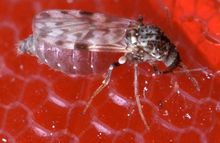Shetland ponies' immune response to insect bites is helping scientists understand how people could be prevented from developing allergies. The horse immune system can respond to midge bites in a way that prevents, rather than triggers, allergic reactions, researchers say, adding that this reaction is similar to what happens in people with allergies.

A biting midge - Cause of allergic response in horses
Researchers at the University of Edinburgh have shown for the first time that all horses respond to midge bites and that their immune system can act in two different ways in response to the allergy-causing irritants in midge bites.
Understanding what triggers allergic reactions could help researchers come up with ways to stop people developing sensitivities.The ponies' immune response to midge bites is similar to what happens in people with allergies, the team says. Understanding what triggers allergic reactions could help researchers come up with ways to stop people developing sensitivities
It was previously thought that ponies which do not suffer an allergic reaction to bites do so because their immune system does not recognize allergens carried by the insects, and as a result does not respond.
However, researchers at the University of Edinburgh have shown for the first time that all horses respond and that their immune system can act in two different ways in response to the irritants in midge bites.
One of these responses produces allergy symptoms such as itching and inflammation, while the other prevents an allergic reaction, researchers say.
The team found that after being exposed to midges, the horse immune system can release various types of factors, known as cytokines, which affect the behaviour of other cells.
Ponies that react to midge bites release cytokines, known as IL-4, which trigger allergy symptoms. In ponies not sensitive to bites, another cytokine, INF-?, is released, which blocks different immune cells that would otherwise trigger allergic reactions, researchers say.
By priming the human immune system to respond to allergens in a way that does not trigger reactions, it could be possible to prevent people developing sensitivities, the team says.
Allergies are caused by a complex interaction between genetic and environmental factors. Researchers say the reason why some individuals develop sensitivities to certain substances, while others do not, is not fully understood. It is unclear what causes the immune system to activate a protective response over an allergic one, the team says.
The study, published in the journal PLOS ONE, was funded by the Dutch Foundation for Technical Sciences (STW) and was carried out in collaboration with researchers in the Netherlands.
Dr Dietmar Zaiss, of the University of Edinburgh's School of Biological Sciences, who led the study, said: "To our knowledge, this is the very first study of a natural allergic disease in which we can show that immune responses to allergens can take two directions, either leading to allergy or to tolerance. We believe this finding could have direct practical implications, for example by helping immune responses to choose the "right" direction in individuals who we would like to protect from developing occupation-associated allergies."
